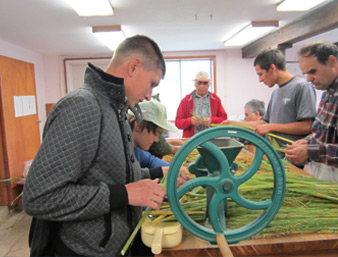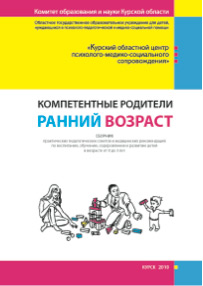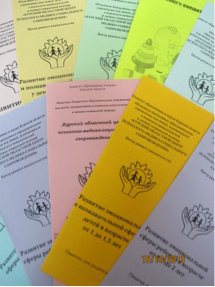

Volume:5, Issue: 4
Dec. 15, 2013


Dec. 15, 2013
KEY WORDS: early childhood intervention, psychological-educational support, center of early intervention, risk factors, parent’s and specialists’ role.
ABSTRACT: Currently Russia considers early intervention support one of its main needs on social, parental and professional levels. Kursk Regional Center of Early Intervention, described in the article, has been founded to meet these needs and to provide an overall support to families and specialists.
Currently, ‘a correction’ of early childhood disorders is considered to be one of the priority areas for medical doctors and educators all over the world.
The importance and necessity of this type of work in Russia is determined by two main factors. The first is a decline in the healthy children’s birth rate which simultaneously increases a number of children with developmental disabilities and consequently, a number of the so-called social orphans (these are the children whose parents are still alive but do not want to take care of their sons or daughters. – Editor’s explanation). The second one is an increase in expenses on special preschool and school education [3].
Russia today is facing an urgent need to create a system of early childhood diagnostics and correction. The importance of this need and necessity is well understood by the specialists from Departments of Education, Public Health Care, Family and Demographics Policy who and are prepared to work in this direction and to actively cooperate with one another in an interdisciplinary mode.
Attention and interest in diagnostics and correction of special needs (whenever possible) in early childhood is also stimulated by a gloomy situation with demographics in Russia on the whole and in Kursk region in particular. We are talking about a considerable decrease of healthy children’s birth rate and also a progressive decrease of fully mature children’s birth rate, together with an increase of complications during childbirth and developmental disabilities of a congenital or prenatal nature.
According to the data received from the Kursk Regional Health Care Department, the number of healthy newborns has decreased from 48.3% to 26.5 % during the last seven years. Presently, about 80% of all newborns are not physiologically mature, about 70% of them have a confirmed birth encephalopathy which, if not treated properly, may cause steady developmental disorders in the future [5]. Clearly, early developmental disabilities may provoke children’s failure to become part of their social and cultural environment, and also their connections with the society and culture are violated. The same can be said about the relations between parents and children at the very early stage – due to the incompetence and lack of knowledge of how to educate and socialize children with disabilities, parents often fail their sons and daughters on a day-to-day basis, being unable to communicate with them and transfer to them all the necessary social skills and experience.
How to provide an effective psychological-educational support?
When it is about early childhood, such a psychological-educational support could be realized if the following conditions are taken into consideration:
A child with special needs who has been treated adequately in the first months of his/her life has all the chances to reach his/her highest level of development rather quickly, and as a result, to become part of the mainstream education (in its inclusive variant) as early as possible.
Most medical doctors and educators who work with small children believe that an overall picture of the child’s development could be obtained only after a serious child’s holistic checkup of a medical and psycho-educational nature. Only such a checkup could show an initial level of physical, social and cognitive development.
Kursk Center of Early Intervention
At the end of 2012 as part of the program “The World of Equal Opportunities” in the Kursk Region, we received an opportunity to launch Center of Early Intervention (CEI) as a separate department of our Kursk Regional Center of Psychological-Medical-Social Support.
The main reasons to start the work of such a Center of Early Intervention in the region are listed below:
The main CEI goal is to provide specialized medical and pedagogical help to small children with serious developmental disorders or to those who are at risk of developing such disorders and who need psychological, educational, medical, and social support.
The initiative to create such a center was supported by the Regional Health Care Department. Presently CEI works in close cooperation with this department. There was a special Kursk Regional Governor’s Order [No. 868 from 11/09/2012] issued to exchange information about children with severe developmental disabilities between the official governing bodies [Kursk Regional Health Care Department order No. 1-1186 from 11/14/2012] and CEI.
Kursk Health Care Department has sent out letters to the hospitals’ delivery departments, Kursk Prenatal Center, children’s polyclinics with recommendations to seek consultations from CEI whenever small children are suffering from serious pathologies. We managed to establish a close collaboration between the Center Head Doctor and the Health Care Department official, responsible for this work. The CEI specialists are regular participants in monthly regional pediatricians’ meetings.
Since its start date, the Center has already provided consultations to over 100 children.
After receiving an individualized “child’s development map” at their local polyclinics, parents come to our Center. Their children’s maps are very helpful as they contain all the personal details and demographics and also a diagnosis, risk factors, and a medical profile given at the local polyclinic.
CEI consultations are eligible for all children who have serious health issues and who belong to one of the following ‘risk-groups’:
Every new family is provided with a consultation by several medical specialists (a neurologist, a pediatrician, a physiatrist, an orthopedist, and a physical therapist) and also with the participation of a speech therapist, a special educator, and psychologist. This team provides the family with a multifactor evaluation of their child’s psychomotor, emotional, and speech development. Together with the overall exam of their child, parents also receive recommendations on how to pursue his/her treatment, feeding, physical development, massage, and physical training. The code and mode of behavior which is important for sustaining positive children’s psycho-emotional development is also discussed with the parents together with special drills for speech and motor development.

The role of parents and center specialists in providing early intervention support and services
CEI specialists strongly believe that the parents can play a critical role in their children's rehabilitation. Research shows that only about 40% of all parents play with their small children, sing lullaby songs to them, read and discuss what they have read together, and express interest in their children's opinions [4]. This can be fully applied to parents of children with special needs. Such parents do need the support of the specialists who should install in them strong beliefs in their ability to help their own children. First and most, we mean the specialists who are aware of how to provide social, psychological and educational support to families.
These are the parents (or legal representatives) who are, by definition, aware of the problem and more than eager to see positive results. They constitute the bulk of our ‘main customers’ interested in the best practices of work with children with special needs. On the other hand, most of the parents lack a psychological competence that dictates an urgent necessity to hold specially organized informative and educational classes for them with the mass media assistance. Well-timed information got by parents about specialists who can provide help to their children and about educational institutions where children may be educated can greatly improve psychological state of parents.
The role of parents and medical doctors in arranging for successful early intervention and children's development is hard to overestimate. These are the people who establish contacts with teachers and psychologists, for the latter to deal with the psychological support of the families and to provide all kinds of professional services to children.
One of the necessary prerequisites that could guarantee success in this type of work is constant professional development of everybody involved in it.
In 2012, Center of Early Intervention specialists (our neurologist, psychologist and physical therapist) received professional development and training at the Early Intervention Institute in St. Petersburg with the specific goal to learn how to use innovative technologies while providing medical and psychological services.
The Center is fully equipped with modern stimulation games and other demonstrational tools, sports and up-to-date computer software. Some diagnostic tools including computer ones, i.e., software "Kent Infant Development Scale; KID Scale-2000" worked out by Early Intervention Institute (St. Petersburg) have been bought and implemented in the CEI work.
The Center has also initiated a ‘Competent Parents’ club. This club is meant to become a teaching place where parents will study methods and ways to deal with children with special needs at an early age.
Brief conclusions
CEI medical doctors and educators have put together a number of valuable recommendations (leaflets, booklets) concerning the following:


Medical doctors and educators at our Center of Early Intervention truly believe that providing all the necessary support at an early age will allow to reduce the severity of the existing problems, ease the interventions’ process and will prepare such children for an integrated education with their physically healthy peers.
Regardless of differences in opinions, our specialists are united in their approach to provide a complex support to children with developmental disabilities and to their families. We truly believe that only in close cooperation with everybody involved and interested we will be able to achieve positive results. At this point there is no force that could move us backwards – we are positive in our decision to move only forwards and achieve positive results.
References

Home | Copyright © 2025, Russian-American Education Forum